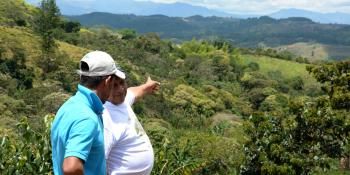Climate scenarios and analogues: A glimpse into past, present and future climates

The CCAFS East Africa program held a successful workshop last year linked to the ongoing work on climate scenarios and analogues. This approach, comparing one area's climate with another area's projected climate scenario, can help design adaptation strategies in agriculture.
It all began with a brief round of introduction. In the room were a rich mix of participants, 23 in number, drawn from universities, research institutions, Non-Governmental Organizations (NGOs) and the Ministry of agriculture in Kenya. The trainers were Edward Jones and David Arango from the International Center for Tropical Agriculture (CIAT) Colombia.
Soon after, we got to the real business of the day - carrying out the workshop on climate scenarios and analogues for designing adaptation strategies in agriculture. This workshop was organized by the CGIAR Research Program on Climate Change, Agriculture and Food Security Program (CCAFS), East Africa in November of last year.
“The Climate Analogues approach identifies areas where the climate today is similar (analogous) to a future projected climate for a reference site. The analogue sites can be backward, forward or with no direction” said Edward Jones. One can answer the questions:
- Where can I find a site whose present climate is similar to the projected future climate of my reference site? (backward)
- Where can I find a site whose projected future climate will be similar to the present climate of my reference site? (forward)
- Where can I find a site whose present climate is similar to the present climate of my reference site? Or where can I find a site whose future climate may be similar to the future climate of my reference site? (no direction)
View the presentation given during the workshop by Edward Jones and David Arango
In this training, participants learnt how to find the climate analogue sites by using an online platform and also offline through the Analogues R package. To use the online tool, one does not require skills in the R package. However, the datasets can be downloaded and used offline. As opposed to the online platform, the R package provides an added advantage of doing a finer search by including soil information when selecting the analogue sites.
Already climate Analogues approach has been applied in the Farms of the Future project currently ongoing in Lushoto, Tanzania. The backward analogues site was found for Yamba. Farmers from Yamba were then taken on a “learning journey” to visit sites which are climate analogues of their home.
Learn more: East Africa moves towards implementation plans with the Climate Analogues tool
This enabled them to visualize adaptation strategies that may be useful to them in the future. This project also offers an opportunity on the feasibility of germplasm exchanges from analogue sites to the reference site as an approach for gradually adapting agricultural systems to climate change.
“Since I have learnt that my tomorrow’s climate exist somewhere in the world today. Searching where it exists and studying the various anthropogenic activities there can enable us to come up with ideas and pathways to future adaptation”, said Michael Okumu from the Ministry of Agriculture.
He further noted that the information generated through these tools can greatly inform decision makers in the newly devolved administrative units in Kenya on adaptation projects.
“I plan to share what I have learnt with my colleagues working on delivering climate information services to farmers” said Thomas Mawora, a researcher at Maseno University. “We want our farmers to have a glimpse of sites that have the same climate as theirs and to learn from the ongoing adaptation and mitigation activities at the analogue site”, continued Thomas.
This workshop was a follow-up to the regional training workshop held in August, 2012 in Nairobi where country teams developed action plans over the next one year. For Kenya, training of selected professionals from agricultural research organizations, line ministries and policy institutions on the applications of the climate scenarios and analogue tool were identified as priority necessitating this workshop.
Learn more: One farmer's future is another farmer's present: Farms of the Future hits Tanzania
As a way forward, the participants agreed to conduct famer exchange visits for selected study sites to enhance knowledge exchange and adaptation learning among farming communities in Kenya. This will come in handy as the partners are equipped with the necessary knowledge in identifying the analogue sites.
View photos from this workshop held in Nairobi, Kenya.
Phillip Kimeli is a Research Assistant with CCAFS East Africa. Thomas Mawora is a Tutorial Fellow at Maseno University, Kenya.



